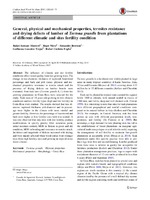General, physical and mechanical properties, termites resistance and drying defects of lumber of Tectona grandis from plantations of different climatic and sites fertility condition

Date
2015-06Author
Serrano-Montero, Rafael
González-Trejos, Guillermo
Córdoba-Foglia, Rafael
Moya-Roque, Róger
Berrocal-Jiménez, Alexander
Metadata
Show full item recordAbstract
The influence of climatic and site fertility conditions affect wood quality from fast growing trees. The change in tree diameter, thickness of sapwood, heartwood percentage and bark and pith tissue, physical and mechanical properties, resistance to termite attack and the presence of drying defects on lumber boards were evaluated. Four teak trees (Tectona grandis L.f.) from fast growing plantations in Costa Rica were selected for the study. Teak trees of 11 years old growing in two climatic conditions and two fertility types (high and low fertility) in Costa Rica were studied. The results showed that tree diameter, sapwood thickness, pith diameter and its percentage were higher in the climate with more rainfall and greater fertility. However, the percentage of heartwood and bark were higher at low fertility sites with less rainfall. It was also observed that only sites with low fertility produce modifications in specify gravity, fiber saturation point, initial moisture content, MOR in flexion in green and dry condition, MOE in bending and resistance to termite attack. Incidence and magnitude of defects increased with drying, and were mainly affected when wood comes from younger trees from high fertility sites and growing in tropical moist forest climate. © 2015, Indian Academy of Wood Science.
Source
Journal of the Indian Academy of Wood Science June 2015, Volume 12, Issue 1, pp 63–73Share
Metrics
Collections
- Artículos [37]
The following license files are associated with this item:


